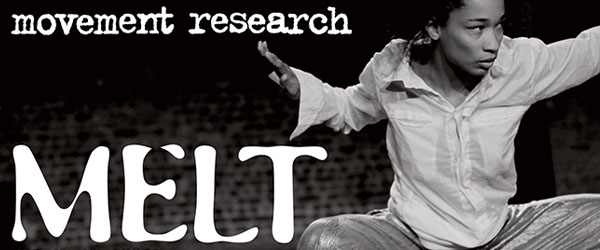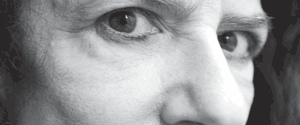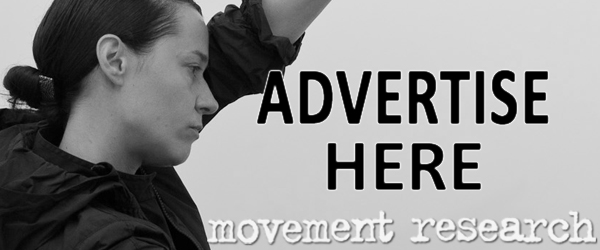Critical Correspondence
- Baryshnikov Arts Center, Caleb Hammons, dance, feminism, interdiscplinary, The Untitled Feminist Show, theater, Young Jean Lee
- 1 comment
- Conversations
- 1.15.12
Young Jean Lee in conversation with Caleb Hammons
Young Jean Lee, playwright and director, talks with producer Caleb Hammons about her new work, The Untitled Feminist Show, now at the Baryshnikov Arts Center through February 4, 2012, as part of the COIL Festival. They discuss Young Jean’s approach to movement practice and the complications of naming and crediting a “Nearly Wordless Show.”
Interview Date: December 29, 2011
Download this conversation as a pdf
Caleb Hammons: Let’s hear from you about what your process is.
Young Jean Lee: What I generally do is I will come up with an idea for a show. Like, I want to make a show about black identity, or I want to make a feminist show, or I want to make a one person show that I perform.
In the case of The Untitled Feminist Show, I knew that I wanted there to be dance in it and that I wanted the performers to be super charismatic. We got these stars of the downtown scene to come in, from all different worlds. Burlesque, cabaret, theatre. Usually, I will generate text through conversation with the cast. For this show, for some reason, all I wanted to work on was the dancing.
Caleb: Your artistic statement says that you think of the worst idea for a play that you could write, and then you force yourself to write it. The show started out as being called The Untitled Feminist Multimedia Technology Show and now it’s just The Untitled Feminist Show. I was curious if initially it was the “Multimedia Technology” or the “Feminist” part that you thought was the worst idea. Or, were they equally bad ideas?
Young Jean: I generally pick political topics because I think political topics are really hard to do well when you’re making any kind of art. It usually ends up coming across as didactic or simplistic. Feminism fell under that category. And, multimedia technology… I feel pretty alienated by it. I thought I would combine those two things together. What ended up happening was it felt like two different shows, and I had time for one or the other and I picked feminism.
Caleb: Was [feminism] something that you have long been interested in? What about it was pressing to you at this moment?
Young Jean: Feminism has really taken a huge hit. Women are in danger of losing a lot of rights that they have already fought for. Things are a little bit scary right now in this country. [Feminism] has been neglected in the mainstream for a while. It felt like the right moment to focus on it again. I can tell by people’s responses. When I mentioned that I was making a feminist show, people weren’t rolling their eyes. They were like, “Oh! What does that mean today? I haven’t heard that word in a long time.”
Caleb: Did you feel like you went into it with certain grievances or particular issues that you wanted to address? The diversity of the performers is pretty broad in terms of age, background, sexual orientation and gender identity. What surprised you and what changed in terms of the initial statement you wanted to make?
Young Jean: The cast is diverse, but it’s also not. We’re all artists and we all work in this downtown arts community. We are diverse for a downtown collective but, in terms of the world at large, we are incredibly homogenous. I feel like a lot of concerns I had were the concerns the performers had. Like with The Shipment. The Shipment was not, by any means, a major statement about black identity. It was about the representation of black performers because the cast was black performers. The entertainment industry and representations of black people became very important because they were important to those performers. The Shipment covers a very narrow slice of the subject. I feel like with the feminist show, it’s the same way. The show covers a very small area of what was of concern to us.
Caleb: One of my favorite stories from the process of The Shipment was that you initially had these grievances that you presented to the cast, and they said, “Those aren’t the things we are concerned about.” That heavily influenced the process of creating the content of the show. In this case, you were closely collaborating with the performers on how they wanted to shape the show, and how you wanted to shape the show. Was there more overlap?
Young Jean: It’s different. I’m not black! But, with this show, I am female.
Caleb: But do you think that still your experience isn’t going to be the same as all of their experiences? The same way that just because those five cast members were black, that doesn’t mean all of their experiences are the same.
Young Jean: It’s not that our experiences are the same; our experiences are totally different. But our sense of what the major issues are is the same. We were most interested in gender limitations and a desire for more gender fluidity.
Caleb: I wanted to touch on The Untitled Feminist Show as a movement based performance work as opposed to a play, which is what you would be more commonly known for doing as a playwright. This was an interesting distinction that happened along the way. I, just in interest of disclosure, was involved in the early planning and conception of this piece.
Young: As the producer.
Caleb: At that point, there was text and there was still “Written and Directed by Young Jean Lee.” Now, the billing has moved to a place where it is “Conceived and Directed by Young Jean Lee.” At what point did the “Written by” leave and why?
Young Jean: After the New Museum workshop [December 2010]. We went to Mount Tremper Arts for a residency, and I was trying desperately to write text for the show. Nothing felt right and I just couldn’t get the text together. Finally we decided to string all of the dances together and just perform that. The audience loved it.
Still I felt this need to have a structuring framework. I kept thinking the framework had to be verbal, so I came up with these title cards that said “First Argument,” “Second Argument,” and “Third Argument.” Then we had Becca [a performer in the show], deliver a monologue at the end. But any text that we gave the audience, they just latched on to it and it just became all about the text. People were being so intellectual about feminism and the show that they weren’t having an emotional response to it at all. That was really unsatisfying.
No matter what I wrote, I knew. I just had this feeling. If the majority of the show is this movement based mode of communication, that is the vocabulary of the show. I feel like if the show weren’t about feminism, it wouldn’t be as much of a problem. The language could be sort of poetic, and people would be like, “Oh, that’s just poetic language.” But, with the show, with the title…if you just put a bunch of nonsense, like “Ding dong” [or] “Dingle berry,” they’ll be like, “Dingle berry! That has to do with the body!”
Caleb: Text is very gendered. Traditional narrative and writing is a very masculine, hierarchical sort of thing. I wonder if because you did say that you felt like the vocabulary was movement—could you not still say that you wrote the show?
Young Jean: I guess so, but with movement it’s tricky. There are a lot of people who offer creative input into my writing, including the performers, but nobody ever has a problem crediting me as the writer. With this show, I think my associate director Morgan Gould and director of choreography Faye Driscoll had a lot of authorial input, as well as the performers, and I wouldn’t feel comfortable calling myself the sole author. I think we all made the “text” together.
Caleb: I have been thinking a lot about how much value is given to a text because it is the thing that in a live performance you can walk away with. It’s the object that can be put down on paper and kept. Do you feel that because this show is without text that you are going to walk away from it without an archival object?
Young Jean: I haven’t thought about that a lot but I think there will eventually be a script that describes what happened in the show. Someone mentioned to me Beckett’s Play Without Words, where he just describes all the movement. The question of what is dance has come up again and again in the course of making this show. I don’t come from a dance background. It’s not super sophisticated choreography. It’s not part of the ongoing dialogue. To that extent, it’s not a dance show.
Caleb: Oftentimes I feel if it’s live performance, but there’s no script then it’s dance, and even if there is some text then it’s still dance. I think it’s just what you decide to call it.
Young Jean: Some people [in the dance world] have been incredibly supportive but there are definitely people who feel a little touchy about it.
Caleb: Have you ever said this is a dance show?
Young Jean: We’ve never called it a dance show. We’ve called it a “Nearly Wordless Show.” That’s the closest we’ve come.
Caleb: There is a lot of discourse going on about that sort of thing right now in the contemporary art world and the performance world in regards to visual artists saying, “Now I am going to do a piece of theatre,” or “Now I am going to do a dance.” Why couldn’t you just make a piece that was all movement and call it a play? I think that’s how it should be.
Young Jean: I agree. But some people feel that directing movement has to be called choreography.
Caleb: What’s the difference between choreography and directing?
Young Jean: That’s the question that has come up.
Caleb: If you’re a director who’s staging, you’re choreographing something, right?
Young Jean: That’s the thing. I feel like people get really threatened by not having these divisions between things.
Caleb: It’s frightening. It’s about training. You feel like you own it because you’ve worked for it.
Young Jean: Right. One of the reasons why I am so disregarding of those categories is because I don’t have training in anything. When I started writing my first plays, I didn’t have any writing training, I didn’t have directing training. I am completely untrained in everything.
It reminds me of my associate director, Morgan Gould, when she was in school there was this visual artist who decided to make a play and he knew nothing about theater. He made something that fit his idea of what a play is and it was amazing. I feel like there is an energy there. Somebody who doesn’t know what they’re doing and doesn’t know what the world is that they are going into, it can expand the field.
…
I did want to talk about the process of collaboration. It started out with us generating a ton of material based on the performers’ improvisation, and then we would build draft after draft. Because of how the schedule worked out, Faye couldn’t be around all the time, but whenever she did come in she would usually make some key discovery or contribute some essential idea that made everything click into place. There were dances where Faye did most of the choreography, and there’s a romantic duet where the performers did most of the choreography. And then Morgan and I would come in and change stuff. It was a crazy process of somebody making something and somebody else changing it and somebody else changing it again. The question of ownership got really difficult.
Caleb: What do you think your role was in it then? What would you call it?
Young Jean: It’s a director.
Caleb: You were directing the show but you weren’t working with text so that is choreography in a way. I think that there are a lot of choreographers who generate material through collaboration with their performers.
Young Jean: Only, in choreography it’s stickier. Is generating movement choreography? And, I think a lot choreographers think it’s not. But, we put in the program, “In collaboration with the performers.” We were counting their contributions.
Caleb: If generating movement isn’t choreography, then is generating text not writing?
Young Jean: That’s a good question. I feel like we were beating our heads against the wall about all this stuff. It’s really dicey. This show makes me really realize the extent to which crediting is really limited. It’s the same thing with gender!
Caleb: That’s what I am realizing. We are sitting here and we’re talking about this show that has absolutely no words but we are analyzing it with words that are just leading us in circles because we can’t define any of these things. It feels so analytical and not what the spirit of the piece is.
Young Jean: The show is definitely way bigger than any of us because I feel like we are a lot more limited as human beings. The show is representing something that is beyond that, because we think in terms of categories.




1:01 pm
January 16, 2012
Many thoughts on this writing and also on having seen the Untitled Feminist Show. The one thing that stands out for me in this short response right now is “The question of ownership got really difficult.” that Young Jean Lee said above. That resonates with words floating in me looking for expression about how I feel having seen the piece. Other words may land eventually.
post a comment ›